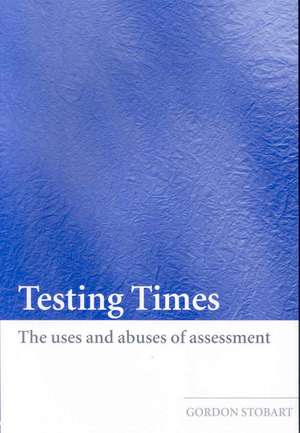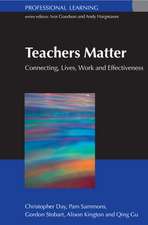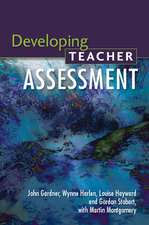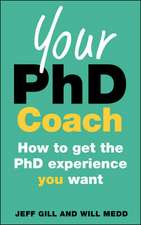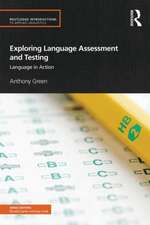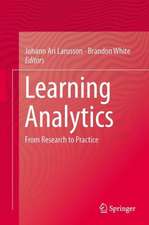Testing Times: The Uses and Abuses of Assessment
Autor Gordon Stobarten Limba Engleză Paperback – 26 mar 2008
Gordon Stobart critically examines five issues that currently have high-profile status:
- intelligence testing
- learning skills
- accountability
- the ‘diploma disease’
- formative assessment
This book raises controversial questions about current uses of assessment and provides a framework for understanding them. It will be of great interest to teaching professionals involved in further study, and to academics and researchers in the field.
| Toate formatele și edițiile | Preț | Express |
|---|---|---|
| Paperback (1) | 333.56 lei 22-36 zile | +21.00 lei 5-11 zile |
| Taylor & Francis – 26 mar 2008 | 333.56 lei 22-36 zile | +21.00 lei 5-11 zile |
| Hardback (1) | 1056.14 lei 43-57 zile | |
| Taylor & Francis – 26 mar 2008 | 1056.14 lei 43-57 zile |
Preț: 333.56 lei
Nou
Puncte Express: 500
Preț estimativ în valută:
63.83€ • 66.82$ • 52.81£
63.83€ • 66.82$ • 52.81£
Carte disponibilă
Livrare economică 17-31 martie
Livrare express 28 februarie-06 martie pentru 30.99 lei
Preluare comenzi: 021 569.72.76
Specificații
ISBN-13: 9780415404754
ISBN-10: 0415404754
Pagini: 228
Ilustrații: black & white illustrations
Dimensiuni: 156 x 234 x 13 mm
Greutate: 0.41 kg
Ediția:1
Editura: Taylor & Francis
Colecția Routledge
Locul publicării:Oxford, United Kingdom
ISBN-10: 0415404754
Pagini: 228
Ilustrații: black & white illustrations
Dimensiuni: 156 x 234 x 13 mm
Greutate: 0.41 kg
Ediția:1
Editura: Taylor & Francis
Colecția Routledge
Locul publicării:Oxford, United Kingdom
Public țintă
Postgraduate and ProfessionalCuprins
1. Assessing Assessment 2. Intelligence Testing: how to create a monster 3. The resistance movement: multiple and emotional intelligences 4. The lure of learning styles 5. The diploma disease - still contagious after all these years 6. The long shadow of accountability 7. Reasons to be cheerful: assessment for learning 8. Reclaiming assessment: becoming responsible for who we are
Recenzii
Review of book proposal by Gordon Stobart
RECLAIMING ASSESSMENT
Report by Paul Black
This is a very interesting book, which gives a broad overview of a fiel.d in which issues of education have important reciprocal interactions with a broad range of social effects.
I address your schedule of issues as follows :
1 and 2 The book does not duplicate any existing work. For market in the UK, it could appeal to two groups :
• General audience of policy makers and practitioners in education and/or
• Students on masters course in education.
My main concern here would be whether it might fall between two stools in compromising between the interests of these two audiences. For the wider audience, the style would have to be direct and assertive in a mode that might be unsuitable for masters students. An old book - Banesh Hoffman’s The Tyranny of Testing illustrates the assertive approach.
For student use, it draws upon an obviously excellent course - but I would comment that for a course on assessment at this level, my own emphasis would be different - not necessarily better. A comparison with my book - Assessment Friend or Foe ? - would show up the differences. So the book might be recommended reading for many, but is less likely to be in the category of recommended reading (probably strongly recommended) for most courses..
The appeal outside the UK might not be strong unless more were included, about traditions and issues in other countries, in explicit form, so that the French Bac, the USAs SAT and No Child Left Behind test requirements, the spread of the UKs testing policies to New Zealand and Australia, and so on.
3 About £ 15
4 See my comments above - the proposal does consider most alternatives carefully and has a clear and interesting vision which is his own.
5 The issues are not ephemeral, but since they are in the interface between assessment principles on the one hand and political and public policy on the other, the surface features of the debate might well look very different in five years time. However, it is clearly impossible to produce a book which is does respond to current interests and is also timeless.
6 Gordon Stobart is a recognised authority - and his experience in the policy, the academic and the journal publishing fields means that he is uniquely qualified to address the broad scope of this work.
7 The coverage is very good, but I would add a few suggestions thus
Ch 1 - I would suggest that reliability might be more clearly highlighted in relation to fitness for purpose.
Ch 2 - reference to the book entitled "The Rising Curve" would strengthen the IQ critique given here.
Ch.3 - It might help to stress some critique of the notion of ‘skills’ as context independent abilities with examples e.g ‘problem solving’.
Ch 4 - The paradox of the general public distrust of professionals set alongside the lack of alternatives and the trust in even undesirable alternatives might be explored here, particularly in the trust in written tests. Also a look across the spectrum might enrich e.g. Key Stage assessments versus the Ph.D. exam, and methods used for appraisal for promotion in the workplace.
The issue of motivation, affect, ego and task involvement in relation to the impacts of assessment systems on those assessed might justify some attention - perhaps in Chapters 5 or 6.
8 Yes I recommend publication without reservation. My comments above would apply to any possible book, and with far greater negative force to most possibilities. I would like to see it in print.
RECLAIMING ASSESSMENT
Report by Paul Black
This is a very interesting book, which gives a broad overview of a fiel.d in which issues of education have important reciprocal interactions with a broad range of social effects.
I address your schedule of issues as follows :
1 and 2 The book does not duplicate any existing work. For market in the UK, it could appeal to two groups :
• General audience of policy makers and practitioners in education and/or
• Students on masters course in education.
My main concern here would be whether it might fall between two stools in compromising between the interests of these two audiences. For the wider audience, the style would have to be direct and assertive in a mode that might be unsuitable for masters students. An old book - Banesh Hoffman’s The Tyranny of Testing illustrates the assertive approach.
For student use, it draws upon an obviously excellent course - but I would comment that for a course on assessment at this level, my own emphasis would be different - not necessarily better. A comparison with my book - Assessment Friend or Foe ? - would show up the differences. So the book might be recommended reading for many, but is less likely to be in the category of recommended reading (probably strongly recommended) for most courses..
The appeal outside the UK might not be strong unless more were included, about traditions and issues in other countries, in explicit form, so that the French Bac, the USAs SAT and No Child Left Behind test requirements, the spread of the UKs testing policies to New Zealand and Australia, and so on.
3 About £ 15
4 See my comments above - the proposal does consider most alternatives carefully and has a clear and interesting vision which is his own.
5 The issues are not ephemeral, but since they are in the interface between assessment principles on the one hand and political and public policy on the other, the surface features of the debate might well look very different in five years time. However, it is clearly impossible to produce a book which is does respond to current interests and is also timeless.
6 Gordon Stobart is a recognised authority - and his experience in the policy, the academic and the journal publishing fields means that he is uniquely qualified to address the broad scope of this work.
7 The coverage is very good, but I would add a few suggestions thus
Ch 1 - I would suggest that reliability might be more clearly highlighted in relation to fitness for purpose.
Ch 2 - reference to the book entitled "The Rising Curve" would strengthen the IQ critique given here.
Ch.3 - It might help to stress some critique of the notion of ‘skills’ as context independent abilities with examples e.g ‘problem solving’.
Ch 4 - The paradox of the general public distrust of professionals set alongside the lack of alternatives and the trust in even undesirable alternatives might be explored here, particularly in the trust in written tests. Also a look across the spectrum might enrich e.g. Key Stage assessments versus the Ph.D. exam, and methods used for appraisal for promotion in the workplace.
The issue of motivation, affect, ego and task involvement in relation to the impacts of assessment systems on those assessed might justify some attention - perhaps in Chapters 5 or 6.
8 Yes I recommend publication without reservation. My comments above would apply to any possible book, and with far greater negative force to most possibilities. I would like to see it in print.
Descriere
This book raises controversial questions about current uses of assessment and provides a framework for understanding them. It will be of great interest to teaching professionals involved in further study, and to academics and researchers in the field.
